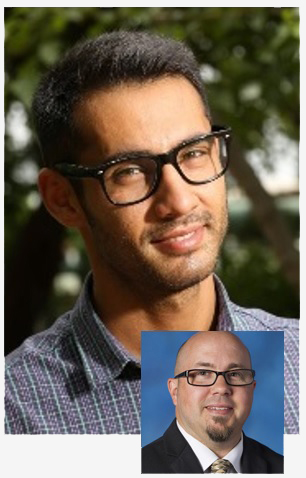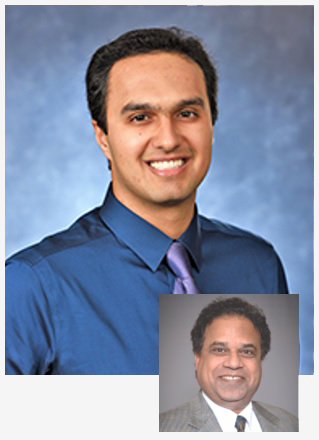Three students from the University of Pittsburgh Department of Bioengineering received 2020 American Heart Association Predoctoral Fellowships, which provides up to two years of project support for aspiring academic and health professionals. Four of the five principal investigators associated with these students are McGowan Institute for Regenerative Medicine affiliated faculty members.
“The Swanson School of Engineering has placed an emphasis on encouraging and helping PhD students to compete for the prestigious national predoctoral fellowships because this effort is highly relevant from both educational and professional development perspectives,” said McGowan Institute faculty member Sanjeev Shroff, PhD, Distinguished Professor and Gerald E. McGinnis Chair of Bioengineering. “This is the largest number of AHA fellowships the Department of Bioengineering PhD students have received in a single year, and I am proud of the research accomplishments of each of these students. I look forward to seeing the continued growth of these students as independent investigators.”
Ali Behrangzade (PI: McGowan Institute affiliated faculty member Jonathan Vande Geest, PhD)
 Mr. Behrangzade works in the Soft Tissue Biomechanics Laboratory (STBL) where they have extensive experience in design, optimization, manufacturing and in vivo evaluation of tissue-engineered vascular grafts (TEVGs). These grafts are used in a coronary artery bypass procedure which is required for most patients with coronary artery disease (CAD). The surgery requires autologous vessels, which are blood vessels harvested from the patient’s own body, however, these vessels are not always suitable because of prior harvesting or pre-existing vascular disease.
Mr. Behrangzade works in the Soft Tissue Biomechanics Laboratory (STBL) where they have extensive experience in design, optimization, manufacturing and in vivo evaluation of tissue-engineered vascular grafts (TEVGs). These grafts are used in a coronary artery bypass procedure which is required for most patients with coronary artery disease (CAD). The surgery requires autologous vessels, which are blood vessels harvested from the patient’s own body, however, these vessels are not always suitable because of prior harvesting or pre-existing vascular disease.
One of the major causes of graft failure in reconstructive CABG surgery is intimal hyperplasia (IH). This pathological condition is characterized by the thickening of the inner layer of a blood vessel due to an undesired mechanical and biological environment. As part of Mr. Behrangzade’s TEVG project, he will create an optimized TEVG-patch system and surgically connect it to an artery (anastomose) to evaluate the performance in an animal model.
“Our approach will be to use a combined experimental and computational strategy to design, fabricate and assess the ability of a mechanically and geometrically optimized biopolymer TEVG-patch to maintain the homeostatic biomechanical environment (solid and fluid) in an end-to-side anastomosis,” said Mr. Behrangzade “We hypothesize that this will reduce the incidence of IH and therefore improve the patency rate of bypass procedures. The optimized graft-patch will then be fabricated and implanted into a rabbit carotid artery end-to-side anastomosis model to assess the function of the graft-patch system in vivo. The results of this study will potentially make significant improvements in the outcome of CABG surgery.”
Soroosh Sanatkhani (PI: McGowan Institute faculty member Sanjeev Shroff, PhD, and Carnegie Mellon University’s Prahlad Menon, PhD)
 Mr. Sanatkhani is involved in multiple cardiovascular research projects under the supervision of Dr. Shroff, and Prahlad Menon, PhD, adjunct assistant professor of bioengineering at Pitt. His primary research is focused on hemodynamics indices and shape-based models of the left atrial appendage (LAA) of the heart to enhance stroke prediction in atrial fibrillation (AF).
Mr. Sanatkhani is involved in multiple cardiovascular research projects under the supervision of Dr. Shroff, and Prahlad Menon, PhD, adjunct assistant professor of bioengineering at Pitt. His primary research is focused on hemodynamics indices and shape-based models of the left atrial appendage (LAA) of the heart to enhance stroke prediction in atrial fibrillation (AF).
“In this study I plan to create two novel, patient-specific indices to improve the prediction of stroke in AF patients,” said Mr. Sanatkhani. “The first index is a hemodynamics-based calculation of residence time in LAA, which represents the probability of clot formation in the LAA and consequently a metric for stroke risk. The second index will quantify the LAA appearance (shape), which will help us correlate the probability of stroke with geometrical features of LAA.”
According to Mr. Sanatkhani, this project should result in a new and significantly improved method to predict stroke risk in patients with atrial fibrillation, which will enhance the clinical management in these patients
Danial Sharifi Kia (PI: McGowan Institute affiliated faculty members Marc Simon, MD, and Kang Kim, PhD)
 Mr. Sharifi Kia’s research is focused on right ventricular biomechanics in pulmonary hypertension, under the supervision of Drs. Simon and Kim, associate professors of medicine and bioengineering.
Mr. Sharifi Kia’s research is focused on right ventricular biomechanics in pulmonary hypertension, under the supervision of Drs. Simon and Kim, associate professors of medicine and bioengineering.
The heart-lung system in the human body handles carrying blood from the heart to the lungs. Pulmonary hypertension (PH) is a disease that results from the arteries in the heart-lung system getting restricted, which leads to high blood pressure in these arteries and the heart. As a result, the heart needs to work harder to pump blood, eventually leading to heart failure – the main cause of death for nearly 70 percent of PH patients. Despite many developments, to date, lung transplantation remains the only cure for PH and current imaging techniques are often not able to effectively track the structural alterations in the heart of PH patients.
“We are currently working on a newly developed drug called Sacubitril/Valsartan (Sac/Val) that has shown great potential for heart failure treatment,” said Mr. Sharifi Kia. “We test the effectiveness of treatment with this drug in PH by using an animal model of PH in rats. Furthermore, we will also be developing a novel high-frequency ultrasound imaging technology to visualize the fiber architecture of the heart of PH patients with enough resolution.
“Since Sac/Val is already FDA-approved, results of this study can be quickly translated into the clinic and provide a treatment option for PH patients,” he continued. “Additionally, the proposed imaging technology may improve monitoring of structural changes in the heart of PH patients.”
Congratulations, all!
Illustration: University of Pittsburgh (students) and McGowan Institute for Regenerative Medicine (faculty).
Read more…
University of Pittsburgh Swanson School of Engineering News Release
